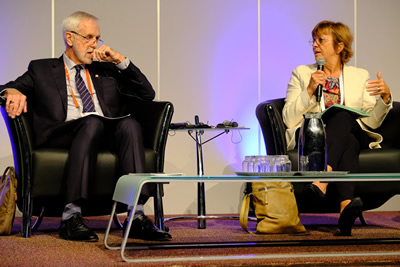Standards give consumers peace of mind when buying everything from food to baby toys, but the costs associated with certification, such as an organic label, are often passed on to the weakest – and poorest – link in the value chain, UNCTAD Deputy Secretary-General Isabelle Durant has told the general assembly of the International Standards Organization (ISO) meeting in Geneva, Switzerland, from 24 to 28 September.
Since its founding in the wake of World War II in 1947, ISO has set more than 22,000 standards that governments can adopt to help protect their citizens and environment. Examples include the standards that ensure stoves and microwaves are safe and that cleaning products are free of substances that deplete the ozone layer.
This is good for sustainable development, ISO President John Walter said at the 26 September session, titled “Standards and Sustainable Development Goals”.
“ISO standards promote social sustainability by helping countries and communities to improve the health and wellbeing of their citizens. And they promote environmental sustainability by helping businesses and countries manage their environmental impact,” Mr. Walter said.
And for buyers who seek even greater assurance that what they purchase meets their own personal ideals, there now exist 400 or so voluntary standards, such as organic and fair trade labels.
While this is great news for consumers, what’s the impact on producers?
It’s true that growing consumer demand for products that meet sustainability standards offers new markets and business opportunities. The global market for organic products, for example, has skyrocketed from $17.9 billion in 2000 to nearly $90 billion in 2016.
But meeting sustainability standards has become a costly prerequisite for producers to enter global value chains in everything from food, cosmetics, clothing or furniture.
And producers in the poorest countries find it hard to meet the requirements, Ms. Durant said.
In fact, research by UNCTAD shows that helping exporters from the least developed countries to comply with product requirements in the European Union would give a 14% boost to their exports.
Another challenge arising from these standards – often called non-tariff measures – is that the extra money made thanks to a label often ends up in the hands of the big players at the end of the supply chain, while the costs associated with certification are often passed on to the “little guy” at the other end.
“The share of benefits and costs isn’t the same between the actors in the chain, between the small farmer in, for example, Mali, who grows mangoes, and the big business or distributer at the end of the chain who sells mango jam,” Ms. Durant said.
The other issue, she said, is that it’s hard for exporters from developing countries to keep up with all the certifications necessary to gain access to these new markets.
“For a company in a developing country to start exporting a certain product, they must be able to identify all the necessary standards – the perquisites,” Ms. Durant said.
“With so many standards, the challenge is huge,” she said.
So, for Ms. Durant, the growing market for sustainable goods does offer new opportunities for producers in developing countries, but only if they are familiar with the standards and don’t end up overburdened with the costs of certification.
To help them navigate the growing number of prerequisites, UNCTAD and partners have built the largest database of standards that affect exports. The library, known as UNCTAD TRAINS, covers 56 countries amounting to 80% of world trade.
So an exporter of, say, organic mangoes from Mali looking to sell to a grocery store in France can now know all the requirements for the EU market.
The issues of standards and trade, especially for developing countries, will be further discussed at the UNCTAD Non-Tariff Measures Week, which will be held at the Palais des Nations, the United Nations’ European hub, in Geneva from 9 to 11 October.



